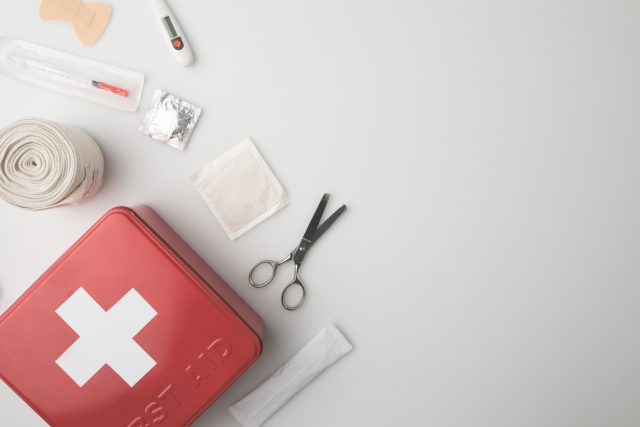You should always be prepared for any medical emergency at work – particularly as an employer. While you may not expect any serious incidents, prior preparation minimises risks and safeguards your business reputation. Medtree are leading suppliers for medical apparatus and first aid kits, and are sharing the options and provisions for your business.
In 2017 alone, there were a reported 609,000 non-fatal injuries. Thankfully, fatal injuries are rare, with the construction industry attributed to the highest number. However, you must be aware of the common causes of injury to ensure you can protect your employees. In the UK, the most reported incidents are due to slips, carrying and handling.
Risk assessment
The Health and Safety at Work Act 1974 outlines the necessity for a risk assessment. An assessment is essential to analysing the safety of the workplace and subsequent conditions. If you are unsure of what to include, we suggest looking at the government website. You can also find many free templates online. The basics of your assessment should include:
- Actions to resolve any medical incidents
- Name the first aiders within the venue
- Identify any unsafe working
Importance of accident reporting
Accident reporting is critical for your business. Should a severe accident occur, and the proper provisions are not in place, you could face more than an employee out of work for a while. Many team members are unaware of the need to report emergencies, protecting them and your company. To rectify this problem, you should extensively outline all information required for accident reporting, providing employees with the forms to do so.
Potential hazards
It’s impossible to eliminate all hazards for your workforce. You would be working all hours available to do so, but you can identify potential hazards and reduce those risks. For example, if you are aware of what commonly causes injury, you can work to improve safety.
Handling incidents
Handling and carrying incidents accounted for 122,000 non-fatal injuries within the UK. While you cannot always be around for events, you can put procedures in place. An example is to provide thorough handling training to your staff, ensure doorways and warehouses are not obstructed, with clear pathways.
Falls
Falls account for the most significant number of incidents across all industries in the UK. Many slips can be avoided with proper measures in place. If there happens to be a spillage, clean it up immediately. Use signs to highlight any potential hazards and use suitable floor materials. Ignoring the most common incidents could leave your business reputation in tatters.
First aid kits
You’d be surprised how many employees are unaware of where their company first aid kits are stored, and who are the first aiders. The size of your workforce should directly correlate with the number of first aid kits. Your basic kit should include:
- Gloves
- Various types of dressing
- Eye pads
- Sharp and blunt scissors
- Instant ice packs
- Sports tape
- Triangular bandages
- Sterile gauze swabs
- Crepe bandages
- Wound wash solution
- Deep freeze spray
- Emergency foil blanket
- Safety pins
- Resuscitation face mask
Emergency medical plan
We cannot stress this point enough, but you need a plan of emergency. You should include all of these factors to your medplan, to protect both your employees and company:
- Proper evaluation of the incident
- Indicate which staff members must undertake incident reporting
- Identify all first aiders and ensure they have had adequate training, and certificates have not expired
- Store first aid kits and certificates in a clear, easy-to-reach place for all employees
- Deliver the emergency medical plan to all staff
- Consult with healthcare professionals
- If you have any medical facilities close by, ask whether they can assist in an emergency
Useful medical apps
Medical apps can certainly never replace the need for proper care and healthcare professionals. However, they can spell the difference between fatal and non-fatal in many cases, with several apps approved by trusted names.
Medical dictionary
The medical dictionary does exactly what you would expect, providing access to more than 180,000 medical terms. The ‘clear, in-depth definitions of medical technology’ could prove invaluable when describing an incident to a healthcare professional. The app, which has several thousand downloads, offers terms for diseases, common ailments, drugs, physiology and even treatments.
First Aid by British Red Cross
The British Red Cross has produced an excellent first aid app, with fantastic guidance for all first aiders and even those that are not properly trained. The app shares step-by-step instructions for many medical incidents, such as asthma, broken bones, burns and even choking.
St John Ambulance First Aid
This app is similar to the above, offered by the trusted St John Ambulance. While both of these apps do not replace official first aid training, they do provide clear guides to assessing an accident and what steps you can take before paramedics arrive. This app boasts the addition of voice instructions, covering major and minor illnesses.
If you put proper medical provisions in place, you can rest assured you have fulfilled your duty of care and ensured the protection of your company reputation.













